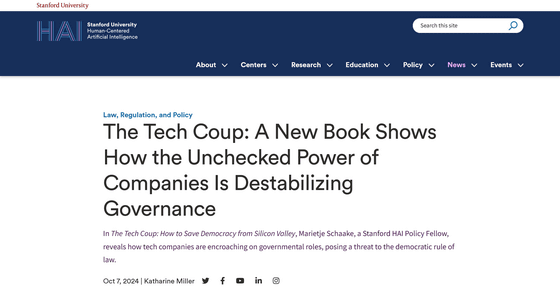How tech companies are undermining the role of government and threatening the democratic rule of law

Marietje Schaake, a policy fellow at Stanford University's Artificial Intelligence Laboratory, warns that technology companies are usurping the role of government and, in the process, upsetting the democratic rule of law.
The Tech Coup: A New Book Shows How the Unchecked Power of Companies Is Destabilizing Governance
https://hai.stanford.edu/news/tech-coup-new-book-shows-how-unchecked-power-companies-destabilizing-governance

Regarding how private companies are assuming functions normally performed by states, Schaake points out that 'in the digital sphere, corporations' control over information, their unfettered agency, and their power to act are almost always greater than those of governments.'
In the private intelligence sector, for example, companies like NSO Group develop and sell spyware like ' Pegasus ,' giving anyone with the money the ability to act as an intelligence agency, hacking into highly private information about political opponents, judges, journalists, critical employees, competitors, and others.
Schaake also argues that offensive cyber capabilities are being deployed by large technology companies, as well as smaller companies, to conduct or provide the means to hack across borders in the name of 'offense as defense.' Examples include NSO Group, facial recognition software maker Clearview, companies that make election technology, and Elon Musk's decision to offer Starlink in Ukraine.
Elon Musk's instructions make satellite internet 'Starlink' available in Ukraine in no time - GIGAZINE

These cyber capabilities and hacking technologies were once monopolized by nation states, but are now increasingly being transferred to private companies, Schaake said, without the checks and balances required in a society governed by the rule of law.
In the Ukraine war, the United States has made it clear that it does not want to commit ground troops, but it continues to engage in aggressive activities in the digital world. Schaake points out that these political contradictions arise because the digital world is a legal gray area. Schaake further said, 'We need more awareness and understanding of how corporations exercise power over governance, democracy, and international law,' and argued that legal clarity, accountability mechanisms, and transparency need to be introduced into the digital world.

Schaake also suggested that the government should be more accountable when outsourcing to technology companies and that the government should be more transparent about energy usage at data centers. For example, there are no reporting requirements or standards for energy and water usage when technology companies build data centers. Furthermore, there is a lack of transparency, with allegations of 'rigged competition between the Department of Defense and the companies' emerging in bids by major companies such as Amazon and Google.
Microsoft wins bidding war for US Department of Defense's $1 trillion cloud business 'JEDI,' while Amazon loses -- GIGAZINE

In the United States, these events have tended to be seen as far away and have been overlooked, Schaake said. However, Schaake pointed out that issues that seemed to be happening far away, such as Facebook's propaganda about the Rohingya genocide in Myanmar , the Cambridge Analytica scandal, and the attack on the U.S. Capitol , are ultimately affecting American citizens through the Internet.
Regarding acting as democratic citizens, Schaake stated that 'individual choices about how we use technology are not enough,' and argued that it is important for citizens to understand that the convenient digital tools provided by technology companies actually influence politics and capital both domestically and internationally, and to recognize the need for independent oversight and countervailing power.

In response to Schaake's argument, the social news site Hacker News also posted a post pointing out that 'the government's geographic governance model is extremely inappropriate for the Internet.' One commenter said, 'For example, if Coca-Cola wants to sell its products in Germany, it needs someone to sell them in Germany and it has to comply with German law. But technology companies are different. They can provide products on the Internet that interact with the data of most German citizens without ever setting foot in Germany, without even knowing that there is a country called Germany and that German laws exist.' He said it is not difficult to imagine that the spread of high-speed, low-cost satellite Internet will make the situation even worse.
Also, on Hacker News, 'The Internet connects everyone and enables the free flow of information, but the free flow of information has caused people to lose trust. We want freedom of speech, but people use words to deceive others or force others to do things. You can't make rules to stop this, and people will always find a way around them. It's human nature to trust each other, but lies spread quickly on the Internet, and after being deceived so many times, people stop trusting others. Where will the Internet crowd go from here?'
Related Posts:
in Note, Posted by log1i_yk






